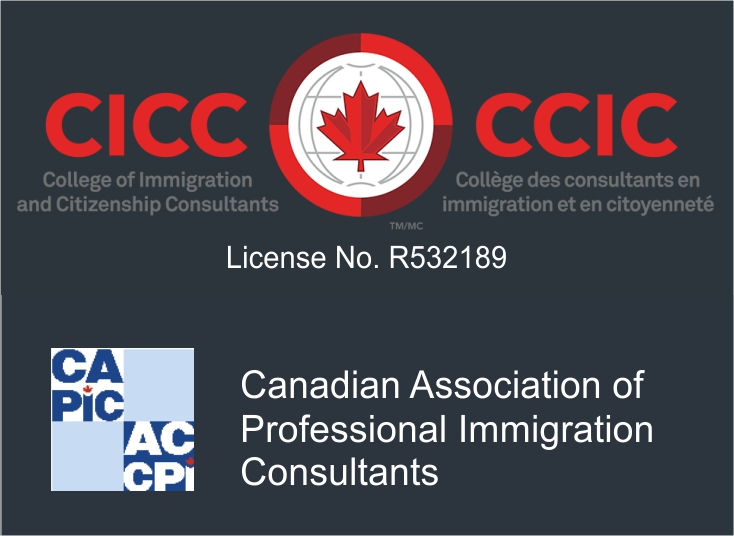5 Benefits When Choosing a Licensed Canadian Immigration Consultant
Licensed Canadian Immigration Consultant vs Local Agency: how similar and different are they?
In almost every country across the world, there are so-called “agencies” that help their citizens enter Canada. While these agencies have successful clients, they also have many failed applications. It can be a hit or miss, and this is largely because of the lack of professional competency of these agencies.
Anyone can put together a visa application based on what they read online. But who can put together a visa application that can truly meet the requirements of Canadian immigration law every time? This is where a licensed Canadian immigration consultant comes in.
A licensed Canadian immigration consultant is officially called RCIC. RCIC stands for Regulated Canadian Immigration Consultants. To be an RCIC, Canadians and permanent residents have to first enroll and study immigration and refugee law, take a licensure exam, register with the regulatory body ICCRC (Immigration Consultants of Canada Regulatory Council), and work with senior consultants.
Does working with an RCIC make a difference? Definitely yes. Here are 5 benefits when you choose to work with licensed Canadian immigration consultant:
1. Professionally trained in immigration law
We spend at least a year studying Canadian immigration and refugee law. By the time we graduate, we fully understand the requirements on how foreign nationals can enter Canada, how they can continue to stay in Canada, and how they can be permanent residents. You benefit from this education because there is no single immigration pathway for everyone. Each person’s immigration journey can be different, simply because each person has a different background in education, work experience, and other qualifications.
2. The Why behind the requirements
Agencies will only ask you to submit the requirements listed by Immigration, Refugees and Citizenship Canada (IRCC). However, being able to submit all the requirements is not a guarantee you will get approved. This is because the requirements provided by IRCC are only intended to satisfy immigration law. When visa officers review your application, they assess it based on immigration law. Even if you have all the documents, if these don’t satisfy the law, you will get refused.
A licensed Canadian immigration consultant approaches this differently. We understand immigration law, which is the Why behind the requirements. So when we see that your submitted documents meet the requirements but not immigration law, we know to ask you for additional documents. These documents may not be on the list of requirements but will help you satisfy immigration law. That immediately increases your chances of visa approval.
3. Submission letters
There is no interview with a visa officer when applying for Canada. The most you can do is send your documents. You won’t have the chance to explain further or defend some parts in your application. However, the licensed Canadian immigration consultant can write a submission letter on your behalf. The submission letter allows her to fight for your approval. She can cite specific sections of immigration law to support your application, explain how you meet the requirements, defend weaker parts of your application and how you addressed them, etc. This can greatly help win visa approval.
4. Options after visa refusal
So your visa application was refused. What next? If you’re not working with a licensed Canadian immigration consultant, you may only refile your application. But is that really your best option? Will it change anything? How do you even know what went wrong with your first application?
If you’re working with an RCIC, we can actually request for a copy of your visa officer’s notes. This lets us see the reasons behind the visa officer’s refusal of your application. After we see the notes, we can assess the best course of action. We can do 1 of 4 things:
- File a request for reconsideration of the visa officer’s decision
- File an appeal, if the recourse is available to the application
- Request a judicial review by the federal court of Canada
- File a new application that specifically addresses the reasons of the visa officer’s refusal
5. Assistance in Canada
This last item is specific to SPIVAS Immigration Consulting only. At SPIVAS, we commit to helping our clients succeed beyond the visa. For this reason, we offer additional assistance to clients once you are in the country. This includes settlement, job search, and networking opportunities.
So before you sign a retainer agreement, think carefully. Can your choice offer everything that you will need to succeed? Hopefully yes. I wish you all the best in your plans and journey to Canada. Make sure to always keep your end goal in mind, so that each step you take will get you there in the soonest possible time.
Do you need to chat? Contact us here.
Also Read: 3 Reasons Why You Don’t Need a Canadian Immigration Consultant Near You
______________________






Leave a Reply
Want to join the discussion?Feel free to contribute!